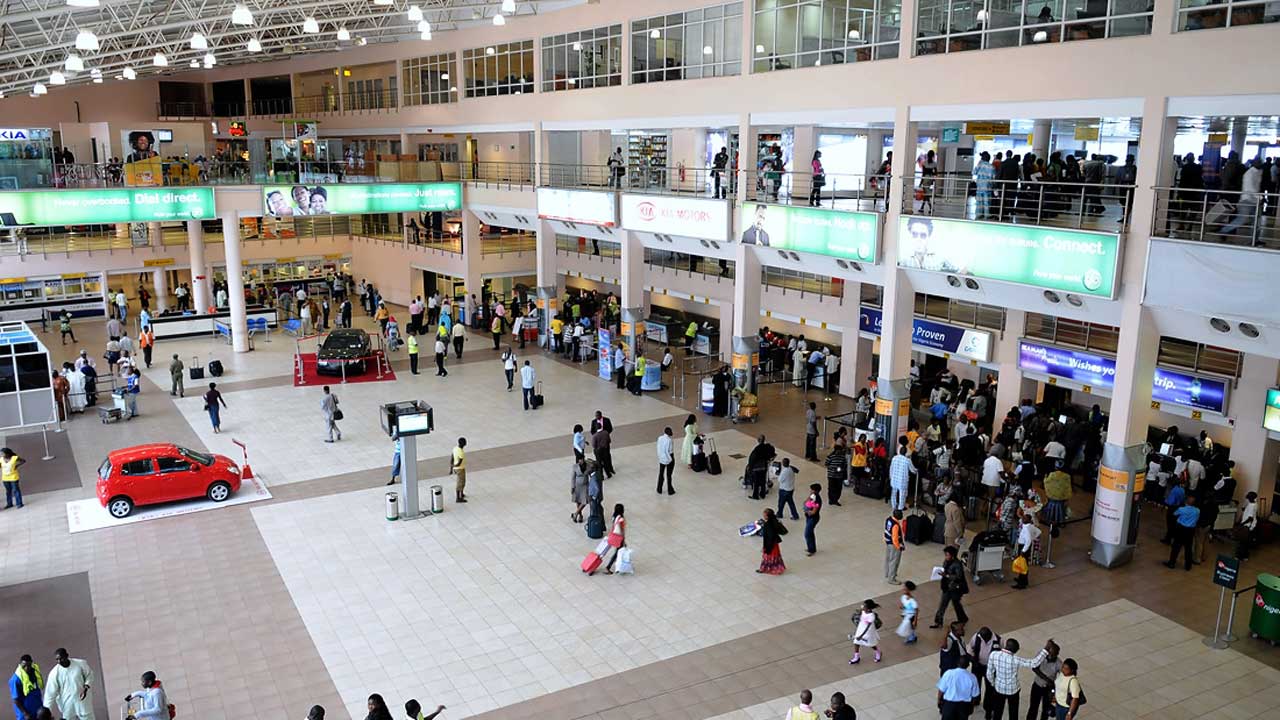- Nigeria’s Airports Record 2.3% Increase in Domestic Passengers in 2yrs
The National Bureau of Statistics (NBS) has disclosed that Nigeria’s airports recorded an increase of 2.3 per cent in domestic passengers in 2015 and 2016.
The NBS made this figure known in its Fourth Quarter 2016 and Full Year 2016 Air Transportation Data released in Abuja.
The report, however, stated that the first and second halves of the year differed substantially.
It stated that it differed substantially whereas year-on-year growth in domestic passenger, numbers of 9.7 per cent and 10.3 per cent were recorded in the first two quarters respectively.
“Declines of 1.3 per cent and 8.2 per cent were recorded in the third and fourth quarters respectively.
“The declines were due to their size, most of this decline was accounted for by Abuja, Lagos and Port Harcourt, and in both quarters, Abuja accounted for the largest fall.
“Murtala Muhammed Airport (MMA) in Lagos remained the busiest domestic airport in the third and final quarters of 2016.
“This airport accounted for 891,770 passengers in the third quarter and 909,851 passengers in the final quarter, which represented 33.3 per cent and 34.5 per cent respectively.’’
According to the report, the share of domestic passengers accounted for by MMA remained broadly stable throughout 2016.
“It remained stable in the year with the highest share recorded in the first quarter of 34.6 per cent, and the lowest recorded in the third quarter.
“As with the overall number of domestic passengers, the number to travel though MMA declined relative to the corresponding values in 2015.
“In the third quarter, MMA airport recorded a year-on-year decline of 7.3 per cent, compared to an overall decline in domestic passenger numbers of 1.3 per cent (when comparing same set of airports.
“In the fourth, this fell slightly to a decline of 7.5 per cent, although this was a smaller contraction than in the overall fall of 8.2per cent.’’
Similarly, it stated that the share of passengers accounted for by Abuja Airport, the second busiest airport in 2016, remained between 30 per cent and 31 per cent in each quarter of 2016.
According to the report, the third and fourth quarters, there were 822,702 and 810,410 domestic passengers to travel through Abuja respectively.
“In each quarter this was equivalent to 30.7 per cent of the total number, which is higher than the shares in the first and second quarter of 30.4 per cent and 30.2 per cent.
“Abuja was the airport to record the largest year on year reduction in domestic passengers in absolute terms in each of the third and fourth quarters.’’
In the third quarter of 2016, the report stated noted that there were 81,270 less domestic passengers to travel through than in the same quarter of 2015, a reduction of 9.0 per cent.
It stated that in the fourth quarter, the year on year drop fell to 110,005, equivalent to a 12.0 per cent fall.
“The third busiest domestic airport in 2016 was Port Harcourt, although the number of passengers fell throughout the year.
Meanwhile, under the domestic aircraft movement, the report stated the shares of domestic flights accounted for by each airport were similar to the shares of passengers accounted for by each airport, as would be expected.
However, it stated that aircraft departing from and flying to larger airports carried more people. Therefore, the share of aircraft accounted for airports such as Lagos and Abuja was smaller than their share of passengers.
“During 2016, Lagos airport accounted for 34.2 per cent of domestic passengers, but only 27.5 per cent of domestic aircraft.
“This is due to the average number of passengers on aircraft to and from Lagos being 61.1 per cent, more than 10 passengers higher than average.
“Similarly, Abuja accounted for 30.5 per cent of passengers, accounting for 24.4 per cent of aircraft.’’
In the third quarter of 2016, the report stated that Lagos recorded a fall in the number of aircraft.
“It recorded a fall in aircraft relative to the second quarter, of 13.8 per cent, to reach 14,097, before rebounding in the final quarter, growing by 9.9 per cent to reach 15,491.
Consequently, the report stated that its share fell to 26.5 per cent in the third quarter from 27.8 per cent in the second, before rebounding to 28.4 per cent in the final quarter.
“Abuja also recorded a decline in domestic aircraft movement in the third quarter; 12,593 aircraft moved through Abuja’s domestic airport compared to 13,682 in the second quarter, a drop of 9.2 per cent.
“However, growth in the amount of domestic aircraft movement in the final quarter was smaller than for Lagos, at 1.4 per cent, resulting in 12,764 domestic aircraft to leave and arrive in Abuja in the final quarter,’’ the report stated.


 Billionaire Watch3 weeks ago
Billionaire Watch3 weeks ago
 Startups4 weeks ago
Startups4 weeks ago
 News4 weeks ago
News4 weeks ago
 News4 weeks ago
News4 weeks ago
 Bitcoin4 weeks ago
Bitcoin4 weeks ago
 Naira4 weeks ago
Naira4 weeks ago
 Forex3 weeks ago
Forex3 weeks ago
 Treasury Bills4 weeks ago
Treasury Bills4 weeks ago
























